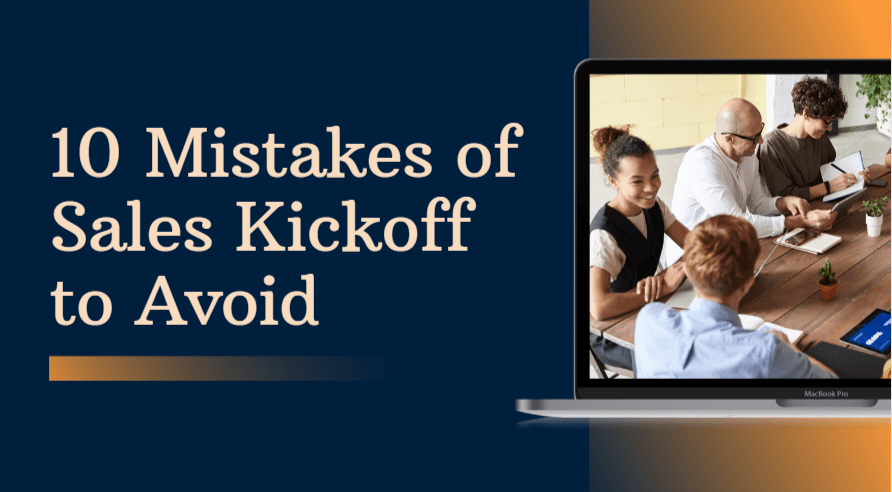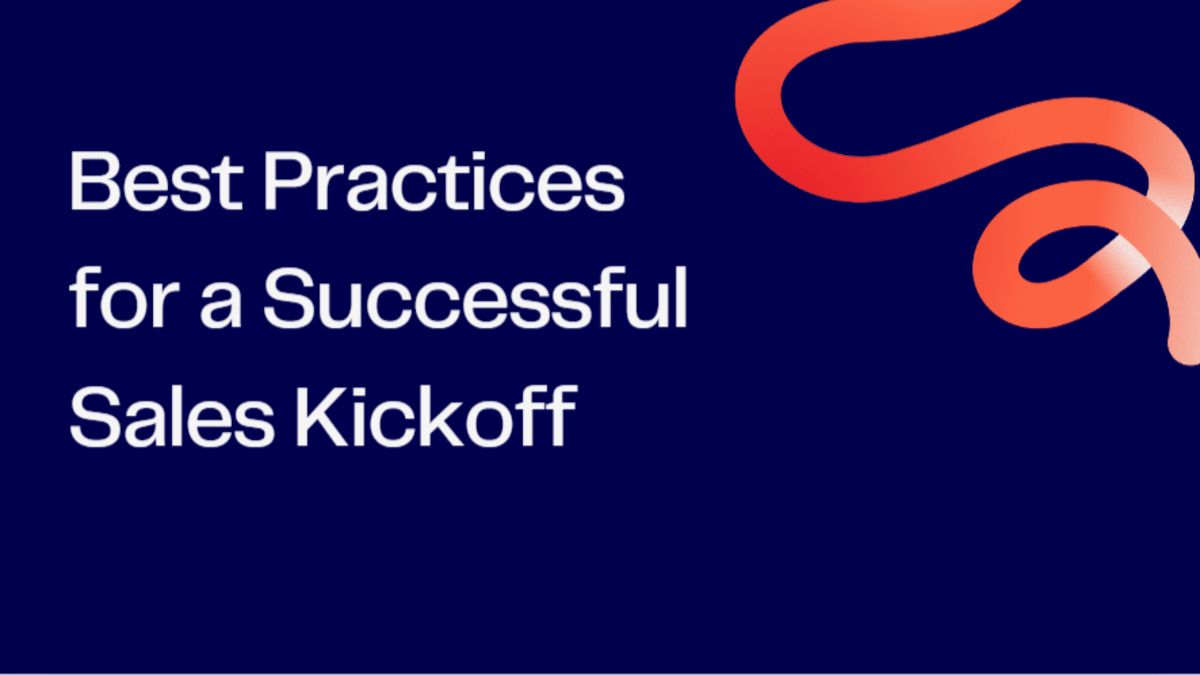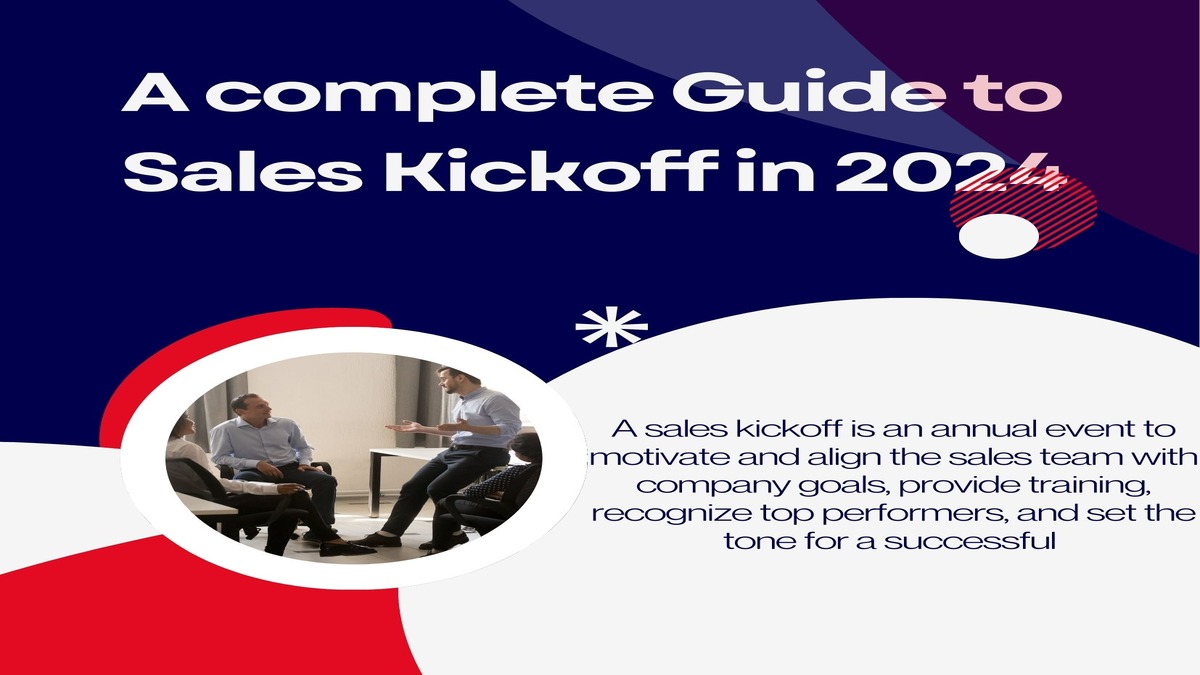Sales Kickoff (SKO) is more crucial than ever for setting the stage for success. This guide will walk you through everything you need to know to make your SKO impactful. This article covers the key elements that make an SKO effective, from planning and executing to following up. This guide offers practical tips and insights to help and make sales kickoff a success. And learn how to energize the team, align everyone with goals, and set a positive tone for the productive year ahead.
What is Sales Kickoff?
A sales kickoff is an annual event where a company’s sales team gathers to start the new sales year with enthusiasm and clear direction. It aims to motivate the team, align them with the company’s goals, provide training on new products and sales techniques, and recognize top performers. The event includes speeches from executives, workshops, team-building activities, and networking opportunities. It sets the tone for the year, boosts morale, and enhances the skills and knowledge of the sales team. Overall, it’s a strategic initiative to ensure the team is prepared and driven to achieve their targets.
Why Sales Kickoff is Important?
Sales kickoffs (SKOs) are vital events for organizations that rely on sales teams to drive revenue. Here are the key reasons why they are important:
1. Alignment on Goals and Strategies:
SKOs provide an opportunity to align the entire sales team with the company’s goals, strategies, and expectations for the upcoming year. This ensures that everyone is on the same page and understands their roles in achieving the objectives.
2. Motivation and Morale Boosting:
These events serve to energize the sales team, celebrating past successes while also motivating them for the challenges ahead. Recognizing top performers and sharing success stories can significantly boost morale and foster a sense of camaraderie.
3. Training and Development:
SKOs typically include training sessions on new products, sales techniques, and tools. This equips the sales team with the necessary knowledge and skills to effectively engage with customers and close deals.
4. Building Relationships:
The kickoff event is an excellent opportunity for team members to network and build relationships across different departments, such as marketing and product development. This collaboration is essential for a cohesive sales strategy.
5. Setting the Tone for the Year:
By establishing clear expectations and a focused agenda, SKOs set the tone for the entire fiscal year. This helps create a motivated and aligned sales force ready to tackle their targets.
Benefits of a Sales Kickoff
Here we provide you some of the benefits of Sales Kickoff
- Increased Motivation: Energizes the sales team and fosters a positive attitude.
- Better Alignment: Ensures all team members understand the company’s goals and strategies.
- Enhanced Skills and Knowledge: Provides training on new products, sales techniques, and market trends.
- Stronger Team Cohesion: Builds a sense of camaraderie and teamwork among salespeople.
- Clear Direction and Focus: Sets clear goals and expectations for the year ahead.
- Recognition and Reward: Celebrates achievements and recognizes top performers.
10 Key Elements of a Successful Sales Kickoff

A well-executed sales kickoff can set the tone for a successful year, motivating your team and aligning them with company goals. Here are ten key elements that contribute to an effective sales kickoff:
1.Clear Objectives
Every successful kickoff starts with well-defined goals. These objectives should align with your overall business strategy and be communicated clearly to all participants. Whether it’s introducing new products, improving specific skills, or boosting team morale, having clear objectives helps focus the event and measure its success.
2. Engaging Agenda
A thoughtfully planned agenda keeps participants interested and makes the best use of everyone’s time. Balance informative sessions with interactive workshops, and include breaks for networking. Consider varying session lengths and formats to maintain energy levels. Remember to leave some flexibility in the schedule for unexpected discussions or extended Q&A sessions.
3. Executive Involvement
Having company leaders present and actively participating sends a strong message about the importance of the event. Executive presentations can provide valuable insights into company direction, market position, and long-term strategy. Ensure executives are available for Q&A sessions to foster open communication and demonstrate leadership accessibility.
4. Product and Service Knowledge
Dedicate significant time to deep dives into your products or services. This is especially crucial if you’re launching new offerings. Go beyond features and benefits – discuss use cases, customer success stories, and common objections. Consider hands-on demonstrations or interactive learning sessions to reinforce product knowledge.
5. Skills Development
Incorporate training sessions that focus on enhancing key sales skills. These could include negotiation techniques, objection handling, or using sales tools effectively. Use a mix of expert presentations, role-playing exercises, and peer-to-peer learning to cater to different learning styles. Consider breaking into smaller groups for more personalized coaching.
6. Customer Perspective
Bringing in the voice of the customer adds tremendous value to a sales kickoff. This could be through customer panels, case study presentations, or even recorded video testimonials. Hearing directly from customers helps sales teams understand pain points, buying motivations, and the real-world impact of your products or services.
7. Competitive Intelligence
Equip your team with a solid understanding of the competitive landscape. Present analyses of key competitors, their strengths and weaknesses, and strategies for positioning against them. This knowledge helps sales teams address customer questions confidently and differentiate your offerings effectively.
8. Team Building Activities
While the focus is on professional development, don’t underestimate the value of team bonding. Incorporate activities that foster collaboration and build relationships among team members. These could range from structured networking sessions to more relaxed social events. Strong team bonds can significantly improve overall sales performance.
9. Recognition and Celebration
Take time to acknowledge and celebrate past successes. Recognize top performers, share success stories, and perhaps even present awards. This not only motivates high achievers but also provides inspiration and learning opportunities for the entire team. Consider highlighting different types of achievements beyond just sales numbers, such as excellent customer service or innovative problem-solving.
10. Action Planning and Follow-up
The impact of a sales kickoff should extend far beyond the event itself. Conclude with clear action items and goals for the coming period. Provide tools or templates for individual action planning. Importantly, establish a follow-up process to reinforce key messages and track progress on goals set during the kickoff. This could include regular check-ins, refresher training sessions, or a mentoring program.
The most successful sales kickoffs are those that energize and equip your team while aligning them with your company’s broader objectives. By incorporating these key elements, you create an event that not only kickoff the sales year but propels your team toward sustained success.
10 Big Mistakes of Sales Kickoff Mistakes to Avoid

Sales Kickoff (SKO) events are crucial for setting the tone for the year ahead. However, even well-intentioned organizations can make mistakes that reduce the effectiveness of these important gatherings. Here are the ten biggest SKO mistakes to watch out for:
1. Lack of Clear Objectives
Many SKOs fail because they don’t have well-defined goals. Without clear objectives, the event can become a jumble of disconnected sessions that don’t drive any real change or improvement. To avoid this, establish specific, measurable goals for your SKO and ensure every part of the agenda supports these objectives.
2. Information Overload
It’s easy to try and include as much information as possible in a sales kickoff (SKO), but this often leads to information overload. Attendees leave feeling overwhelmed rather than energized. Instead, focus on key messages and allow time for processing and discussion. Quality over quantity should be the guiding principle.
3. Ignoring Participant Engagement
Long, lecture-style presentations can make participants lose interest quickly. Failing to incorporate interactive elements, Q&A sessions, or hands-on activities is a missed opportunity. Engage your team with workshops, role-playing exercises, and collaborative problem-solving sessions to keep energy levels high.
4. Neglecting Pre and Post-Event Communication
An SKO doesn’t exist in isolation. Failing to build anticipation before the event or follow up effectively afterwards significantly reduces its impact. Develop a communication strategy that extends before and after the actual event to maximize engagement and reinforce key messages.
5. One-Size-Fits-All Approach
Sales teams often include members with varying levels of experience and different roles. A common mistake is to deliver the same content to everyone, regardless of their specific needs. Consider breaking out into role-specific or experience-level tracks for some sessions to provide more targeted value.
6. Underestimating Logistics
Even the best-planned content can be ruined by poor event logistics. Issues like inadequate venue space, technical difficulties, or poorly planned schedules can create frustration and distraction. Pay close attention to these details to ensure a smooth experience that keeps the focus on the content.
7. Lack of Executive Involvement
When company leaders are absent or only make token appearances, it sends a message that the SKO isn’t a top priority. Ensure meaningful executive participation throughout the event, including Q&A sessions and informal networking opportunities.
8. Focusing Only on Products, Not Customers
Focusing only on product features and specs during an SKO misses the point. It’s crucial to also include customer perspectives, market trends, and the value your products offer. Make sure to balance product details with customer-focused content so your team can fully understand how to meet customer needs and succeed.
9. Neglecting Team Building
SKOs are rare opportunities for geographically dispersed teams to come together. Failing to include team-building activities and networking time is a wasted opportunity. These elements are crucial for building the relationships that support collaboration throughout the year.
10. Lack of Actionable Takeaways
An SKO that doesn’t lead to actual changes in behavior or better performance hasn’t achieved its goal. A frequent mistake is ending the event without giving attendees clear, actionable takeaways. Make sure everyone leaves with specific goals, action items, and resources so they can put what they’ve learned into practice.
Best Practices for a Successful Sales Kickoff

Here are some of the best practices for running a successful virtual sales kickoff:
Before the event
- Set clear objectives and a strategy for the SKO to align the team on goals and priorities for the year ahead.
- Create hype and excitement among the sales team to boost engagement and participation.
- Review your virtual events platform and tools to ensure a smooth experience for attendees.
- Prepare a detailed agenda that keeps the team focused and engaged throughout the event.
During the event
- Incorporate interactive elements like games, quizzes, and polls to make the event more engaging.
- Celebrate successes and recognize top performers to boost morale and motivation.
- Deliver relevant training on new products, sales strategies, and company initiatives.
- Align the team on goals, priorities, and expectations for the year ahead.
After the event
- Provide a takeaway template for reps to reflect on key learnings and how to apply them.
- Use surveys to gather feedback on the event and make improvements for next year.
- Have a plan to reinforce key messages and training throughout the year
- Create an on-demand library of SKO content for reps to reference anytime
By following these best practices, you can deliver a virtual sales kickoff that energizes the team, aligns them on goals, and equips them with the knowledge and tools to succeed in the year ahead. The key is to make the event engaging, interactive and focused on driving long-term behavior change.
Conclusion
FAQs for the Sales Kickoff
These FAQs cover essential aspects of planning, executing, and evaluating a successful sales kickoff, helping you make your 2024 event a standout success.
1. What is the purpose of a sales kickoff in 2024?
Ans: The purpose is to motivate the sales team, align them with company goals, provide training on new products and strategies, and set a positive tone for the upcoming year. It helps ensure that everyone is focused and prepared for success.
2. How should I plan a sales kickoff for 2024?
Ans: Start by defining clear objectives, creating an engaging agenda, organizing logistics, and communicating with attendees. Incorporate interactive elements, training sessions, and team-building activities to keep the team engaged.
3. What are the key components of a successful sales kickoff?
Ans: Key components include executive speeches, product launches, training workshops, team-building exercises, recognition of achievements, and networking opportunities. These elements help in aligning goals and boosting morale.
4. How can I ensure my sales kickoff remains engaging?
Ans: Use a mix of interactive elements like workshops and role-playing, incorporate multimedia presentations, and keep sessions dynamic. Make sure to balance content with activities that keep participants involved and interested.
5. What are common mistakes to avoid during a sales kickoff?
Ans: Avoid overwhelming attendees with too much information, neglecting interactive elements, poor logistical planning, and failing to follow up after the event. Focus on clear, engaging content and smooth execution.
6. How long should a sales kickoff last?
Ans: Most sales kickoffs last between one to three days. The duration should be long enough to cover all essential content and activities but short enough to keep the team’s attention and energy high.
7. Who should be involved in planning a sales kickoff?
Ans: Key planners should include sales leaders, event coordinators, HR representatives, and marketing teams. Collaborating with these departments ensures that all aspects of the SKO are effectively covered.
8. What kind of training should be included in a sales kickoff?
Ans: Include training on new products, sales techniques, market trends, and customer insights. Tailor the training to address current challenges and equip the team with practical skills they need for the year.
9. How do I measure the success of a sales kickoff?
Ans: Success can be measured through participant feedback, engagement levels during the event, whether the goals were achieved, and post-event performance improvements. Look at both qualitative and quantitative results.
10. What should be done after the sales kickoff?
Ans: Follow up by sending recap materials, reviewing key takeaways, scheduling follow-up meetings to track progress, and providing additional resources or support. This helps reinforce the SKO’s impact and ensures continued momentum.
Read More: Top 10 Sales Pitch Techniques for 2024

